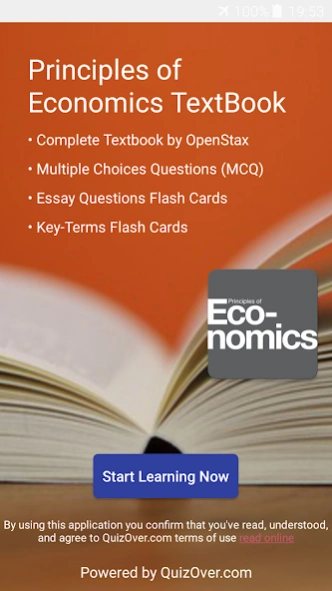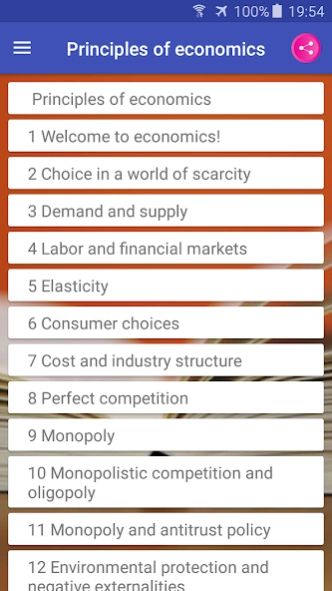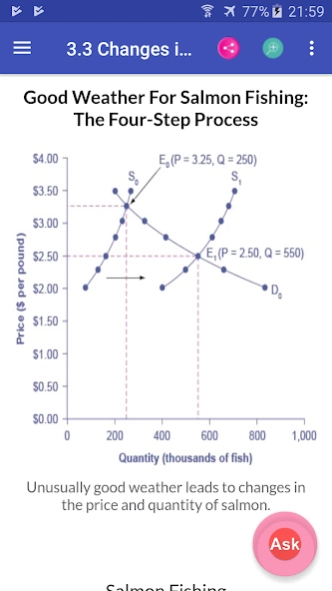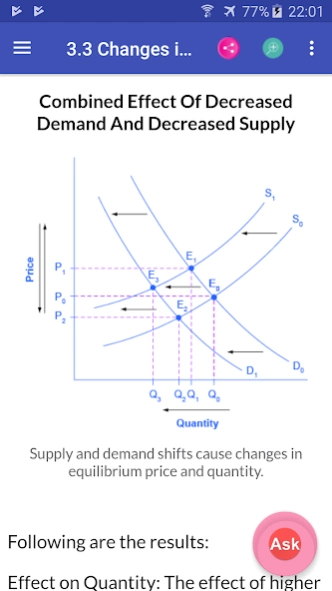Principles of Economics Textbo 2.1.1
Free Version
Publisher Description
Principles of Economics Textbo - Principles of Economics Textbook by OpenStax MCQ, Essay Questions & Key Terms
Principles of Economics by OpenStax plus MCQ, Essay Questions & Key Terms
Principles of Economics covers scope and sequence requirements for a two-semester introductory economics course. The authors take a balanced approach to micro- and macroeconomics, to both Keynesian and classical views, and to the theory and application of economics concepts. The text also includes many current examples, which are handled in a politically equitable way.
* Complete Textbook by OpenStax
* Multiple Choices Questions (MCQ)
* Essay Questions Flash Cards
* Key-Terms Flash Cards
Powered by QuizOver.com the leading online quiz creator
https://www.quizover.com
1. Welcome to Economics!
1.1. What Is Economics, and Why Is It Important?
1.2. Microeconomics and Macroeconomics
1.3. How Economists Use Theories and Models to Understand Economic Issues
1.4. How Economies Can Be Organized: An Overview of Economic Systems
2. Choice in a World of Scarcity
2.1. How Individuals Make Choices Based on Their Budget Constraint
2.2. The Production Possibilities Frontier and Social Choices
2.3. Confronting Objections to the Economic Approach
3. Demand and Supply
3.1. Demand, Supply, and Equilibrium in Markets for Goods and Services
3.2. Shifts in Demand and Supply for Goods and Services
3.3. Changes in Equilibrium Price and Quantity: The Four-Step Process
3.4. Price Ceilings and Price Floors
3.5. Demand, Supply, and Efficiency
4. Labor and Financial Markets
4.1. Demand and Supply at Work in Labor Markets
4.2. Demand and Supply in Financial Markets
4.3. The Market System as an Efficient Mechanism for Information
5. Elasticity
5.1. Price Elasticity of Demand and Price Elasticity of Supply
5.2. Polar Cases of Elasticity and Constant Elasticity
5.3. Elasticity and Pricing
5.4. Elasticity in Areas Other Than Price
6. Consumer Choices
6.1. Consumption Choices
6.2. How Changes in Income and Prices Affect Consumption Choices
6.3. Labor-Leisure Choices
6.4. Intertemporal Choices in Financial Capital Markets
7. Cost and Industry Structure
7.1. Explicit and Implicit Costs, and Accounting and Economic Profit
7.2. The Structure of Costs in the Short Run
7.3. The Structure of Costs in the Long Run
8. Perfect Competition
8.1. Perfect Competition and Why It Matters
8.2. How Perfectly Competitive Firms Make Output Decisions
8.3. Entry and Exit Decisions in the Long Run
8.4. Efficiency in Perfectly Competitive Markets
9. Monopoly
9.1. How Monopolies Form: Barriers to Entry
9.2. How a Profit-Maximizing Monopoly Chooses Output and Price
10. Monopolistic Competition and Oligopoly
10.1. Monopolistic Competition
10.2. Oligopoly
11. Monopoly and Antitrust Policy
11.1. Corporate Mergers
11.2. Regulating Anticompetitive Behavior
11.3. Regulating Natural Monopolies
11.4. The Great Deregulation Experiment
12. Environmental Protection and Negative Externalities
12.1. The Economics of Pollution
12.2. Command-and-Control Regulation
12.3. Market-Oriented Environmental Tools
12.4. The Benefits and Costs of U.S. Environmental Laws
12.5. International Environmental Issues
12.6. The Tradeoff between Economic Output and Environmental Protection
13. Positive Externalities and Public Goods
14. Poverty and Economic Inequality
15. Issues in Labor Markets: Unions, Discrimination, Immigration
16. Information, Risk, and Insurance
17. Financial Markets
18. Public Economy
19. The Macroeconomic Perspective
20. Economic Growth
21. Unemployment
22. Inflation
23. The International Trade and Capital Flows
24. The Aggregate Demand/Aggregate Supply Model
25. The Keynesian Perspective
26. The Neoclassical Perspective
27. Money and Banking
28. Monetary Policy and Bank Regulation
29. Exchange Rates and International Capital Flows
30. Government Budgets and Fiscal Policy
31. The Impacts of Government Borrowing
32. Macroeconomic Policy Around the World
33. International Trade
34. Globalization and Protectionism
About Principles of Economics Textbo
Principles of Economics Textbo is a free app for Android published in the Teaching & Training Tools list of apps, part of Education.
The company that develops Principles of Economics Textbo is QuizOver.com. The latest version released by its developer is 2.1.1.
To install Principles of Economics Textbo on your Android device, just click the green Continue To App button above to start the installation process. The app is listed on our website since 2018-03-20 and was downloaded 3 times. We have already checked if the download link is safe, however for your own protection we recommend that you scan the downloaded app with your antivirus. Your antivirus may detect the Principles of Economics Textbo as malware as malware if the download link to com.quizover.app.course.col11613 is broken.
How to install Principles of Economics Textbo on your Android device:
- Click on the Continue To App button on our website. This will redirect you to Google Play.
- Once the Principles of Economics Textbo is shown in the Google Play listing of your Android device, you can start its download and installation. Tap on the Install button located below the search bar and to the right of the app icon.
- A pop-up window with the permissions required by Principles of Economics Textbo will be shown. Click on Accept to continue the process.
- Principles of Economics Textbo will be downloaded onto your device, displaying a progress. Once the download completes, the installation will start and you'll get a notification after the installation is finished.



